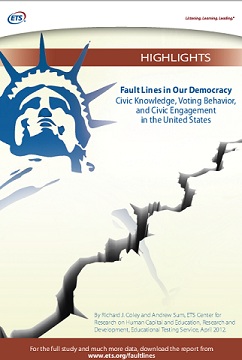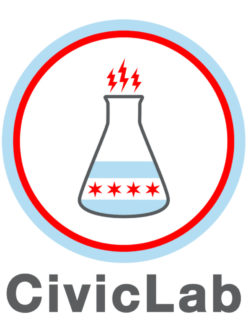 From the Educational Testing Service, “With the presidential election approaching, a new study from Educational Testing Service (ETS) shows that weak civics knowledge among young people is linked to less voting, less volunteering and greater distrust in government. The report calls for sustained efforts on the part of parents, the public, the educational system, and local and national leaders to address these fault lines in our democracy that threaten our nation’s civic well-being.
From the Educational Testing Service, “With the presidential election approaching, a new study from Educational Testing Service (ETS) shows that weak civics knowledge among young people is linked to less voting, less volunteering and greater distrust in government. The report calls for sustained efforts on the part of parents, the public, the educational system, and local and national leaders to address these fault lines in our democracy that threaten our nation’s civic well-being.
Fault Lines in Our Democracy: Civic Knowledge, Voting Behavior, and Civic Engagement in the United States was written by Richard J. Coley of the ETS Center for Research on Human Capital and Education and Andrew Sum of the Center for Labor Market Studies, Northeastern University. The report takes an in-depth look at civic knowledge, voting and civic engagement, and examines how they differ across important segments of our population. In all cases, civic participation was strongly related to one’s age, level of education and skills, and income.
The report warns that many students in U.S. schools lack acceptable levels of knowledge about civics:
- In the most recent national assessment, only about one-quarter reached the “proficient” level, demonstrating solid academic performance.
- Only 27 percent of fourth-graders could identify the purpose of the U.S. Constitution.
- Only 22 percent of eighth-graders could recognize a role played by the U.S. Supreme Court.
Lower voter participation among growing segments of the population is rising just as the United States faces challenges of historic proportions — including a struggling economy, budget deficits, a growing national debt, health care issues, an aging infrastructure, global terrorism and a host of other problems.”
